
The Rover (2014)
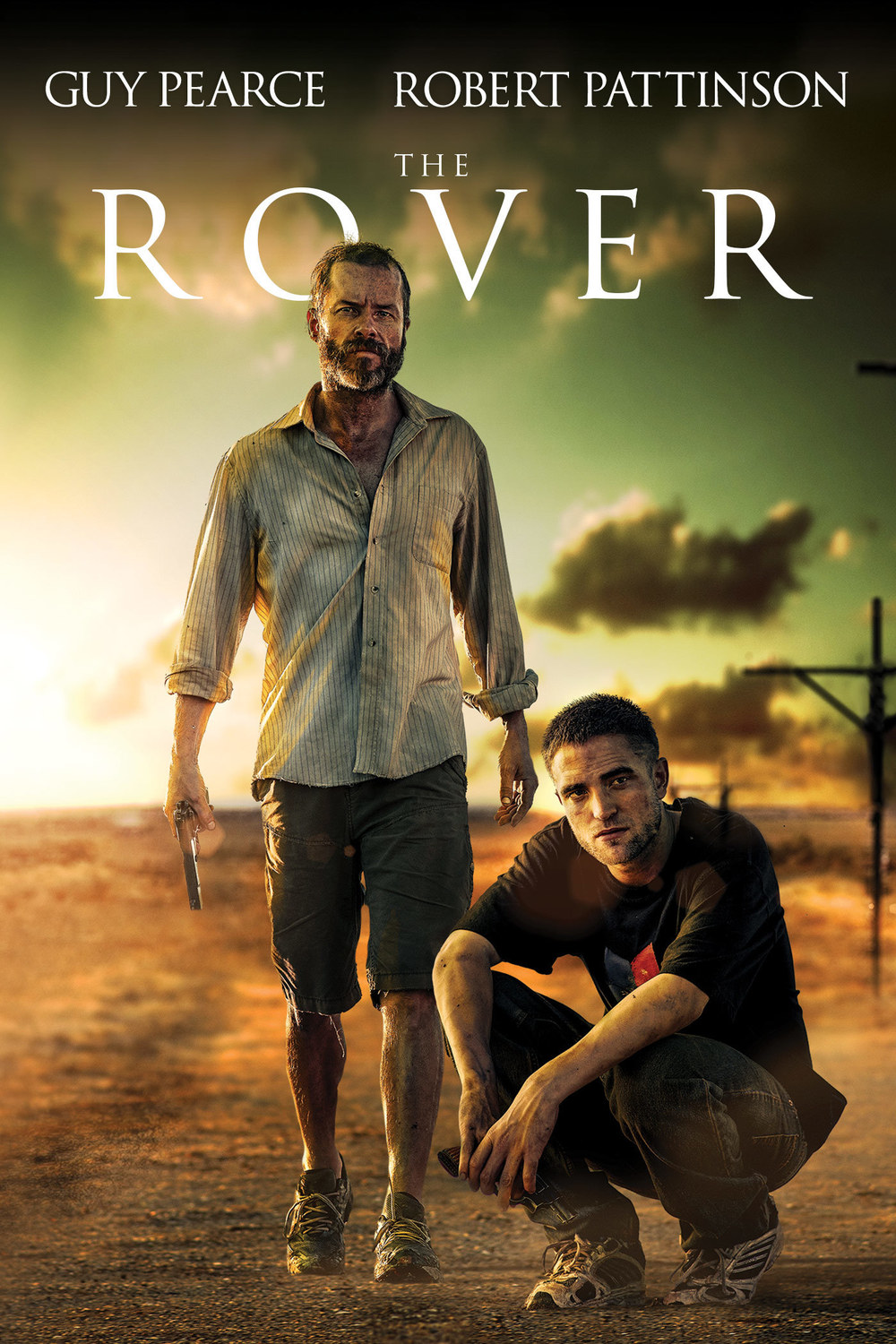
THE TRAILER
THE DIRECTOR
David Michôd
THE ACTORS
Guy Pearce (Eric), Robert Pattinson (Rey), Scoot McNairy (Henry), Tawanada Manyimo (Caleb), David Field (Archie)
THE CAUSE
Economic Crisis
THE STORY
“Australia. Ten years after the collapse.” – opening text.
THE RUNDOWN
The Rover was a movie that seemingly sprang up out of nowhere in the summer of 2014 and flopped. The film got mixed reviews with a slight trend toward positivity and was quickly forgotten as the other films of the summer swarmed in around it. It’s one of those movies that was really always destined for failure in spite of quality: a slow-paced, esoteric, post-apocalyptic neo-western with shades of noir set in Australia. It’s just a shame because it’s a movie that deserves to be better known than it is.
The film takes place in a not-quite-apocalyptic Australian outback. There’s still civilization and commerce but lawlessness is becoming a trend and people have clearly given up living for survival in these troubling times. And the most lawless uncaring bastard around is the film’s protagonist who is never named in the movie but is credited as “Eric.”
Eric’s car is stolen by a trio of men fleeing from a shootout with some soldiers. Eric pursues, but not because they’ve taken his only means of survival; they leave their truck behind in their egress and Eric manages to get it unstuck with ease. And it’s not because Eric’s car is some tricked-out road warrior super-car like Max Rockatasnky’s beloved V8-Interceptor; hiss car is a boring blue sedan with not one interesting feature. It doesn’t even seem to be a matter of any real importance to Eric; he walks up to three armed men and when asked “what makes you think I won’t kill you” he responds, “nothing makes me think that” before trying to choke one. Eric apparently has nothing to live for but something about that car matters to him a great deal.
After being knocked out and left by the trio of men, Eric gets a gun and tries to find clues as to where the thieves went. He has a stroke of luck when one of the thieves’ brother Rey arrives, having been left for dead when the other men fled. Eric gets Rey patched up at a doctor and takes him hostage to help him find the car thieves, but Rey comes willingly because he wants to find his brother. The two set out on a trip that involves far more bloodshed than either had planned.
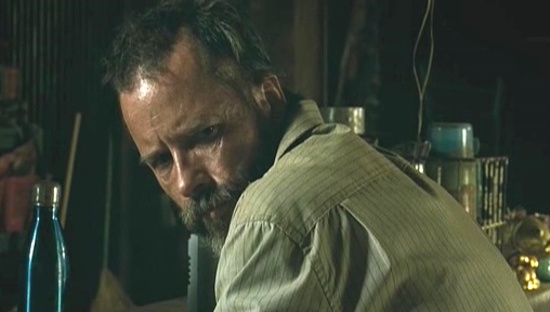
The Rover is instantly comparable to two movies. The first most obvious comparison is Mad Max. Beyond being set in the same country in the same sort of area, both The Rover and Mad Max depict a society that is crumbled but not quite broken yet. Eric is every bit as uncaring and savage as Max after his own film’s third act, he’s a mad dog in a man’s skin and to call him a hero would be an act of profanity. Eric’s world hasn’t quite dipped as far into wanton savagery as Max’s however, no-one is running around Eric’s world who is quite as sick and sadistic as Toecutter and his gang. The closest thing to a “terminal crazy” in the world of The Rover is the lead character.
In many ways this reflects the change in Australian cinema between the glorious drive-in era of Ozsploitation in the 70s and 80s to the spate of dark and genre fare coming out of the country now. Mad Max was bombastic and The Rover is contemplative, both films are equally as dark and equally as vicious, and both films get roughly the same nihilistic message across, they just do it in very different ways. There are no action-packed car chases, no big climactic showdowns or shootouts. Scenes of action and violence are small, uncinematic, and anticlimactic. They’re equally brutal but in a much less fulfilling way.
In this way the film resembles its other easy comparison, The Road. The Road isn’t quite as nihilistic since it ends on a somewhat hopeful note (coincidentally in a scene that involves Guy Pearce) but it has much the same pacing and style as The Rover. The Rover very much feels like a Cormac McCarthy script though it has more in common with his Mexico trilogy or Blood Meridian than The Road. One could even draw parallels between Eric and No Country For Old Men’s Anton Chigurh. The way people say a lot without really saying anything of note, the way nobody seems eager to answer anyone’s questions with a straight answer, the way the story involves the characters on an Aligherian journey through a series of surreal and nightmarish outposts toward a goal that seems of little importance: these are all hallmarks of Cormac McCarthy’s writing, though I don’t think these comparisons were meant to be evoked.
While The Rover feels like Mad Max and The Road, a third film I found myself reminded of upon watching was David Koepp’s The Trigger Effect. In the way The Trigger Effect depicted just how quickly the world turns to savagery in hardship it reminded me of the film’s tense third act. The Rover exists at a tonal and thematic intersection between those three films though I would scarcely call it derivative of any of them. It echos those films while still being wholly its own entity.
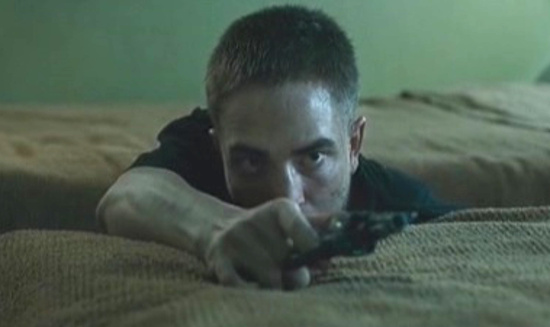
Guy Pearce is wonderful in this movie and I never fail to be impressed by how many different ways he can give such an intense performance. Eric is a dead man walking, he’s alive not out of any real desire but rather a stubborn refusal to be killed. He has no fears, no regrets, no reason to keep going on yet he’s still here pointlessly going on with his life. It’s clear from very early on that there’s something about the car that signifies closure for him (we’ll get to that in a moment) and it’s that; not survival, not revenge, not pride which causes him to chase after the car-thieves.
I don’t know if I’ll ever truly be able to take Robert Pattinson’s career seriously, but this movie certainly showed me what an amazing talent he’s capable of utilizing. Scoot McNairy being Texan is the only reason I can see why they decided to have Rey speak in a southern accent, though I’m sure southern accents being shorthand for “dumb” was part of the reasoning. In any case, while Pattinson does a fine job of sounding authentic he’s at times nearly unintelligible which is a bit of a problem since he probably has the most dialogue of any character in the film.
It’s never really quite explained what the deal is with Rey beyond a few vague lines. Many reviewers jumped to the conclusion that he’s mentally handicapped but I’m not quite sure that’s the case. Rey doesn’t seem to be slow mentally or have any sort of mental deficiencies, he just tends to get choked up while talking and deals with pressure badly, there’s a slight chance that he might be on the autism spectrum but he mostly just seems to be damaged emotionally. It would make sense that he would’ve been a child ten years prior and his brother has been keeping him sheltered in a rapidly devolving world. I’m not even close to qualified enough to make any sort of diagnosis but it would seem he’s suffering from some manner of post-traumatic stress disorder, that coupled with a certain childlike naivete could certainly cause one to infer that he’s a bit on the slow side.
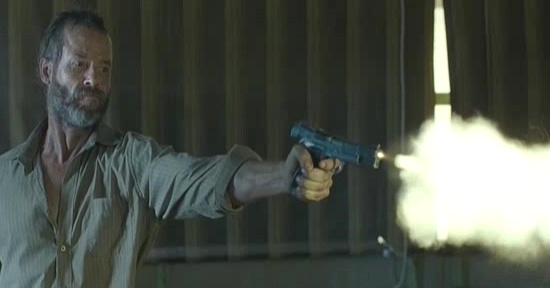
This section is going to the deal with the ending. There’s nothing about The Rover that could really be spoiled by revealing it but if you really want to go into this without knowing then skip down below the next picture.
It never is revealed what exactly Henry, Rey, and the two other men did to get in the shoot-out with the soldiers. As far as the audience knows the soldiers could have been the aggressors and the car-thieves were just defending themselves. None of them seem eager to kill anyone as evidenced by the fact that they leave Eric unconscious next to the truck he was driving with the keys thrown in the grass very close to it. It shows that not only do they not want to kill him, they don’t want him to die from neglect on their part.
While Eric and Rey are staying at a motel, Rey gets spooked by a soldier driving by and shoots the door when someone knocks. When he opens the door he finds that he’s mistakenly killed a little girl who has come to bring them towels. Eric comes and retrieves Rey, killing the soldier who’s shooting at him and the two leads begin a shift in their roles.
When Rey admits that he’s haunted by the reveal that he had killed the little girl, Eric says something uncharacteristically nonsociopathic. He tells Rey that he should think of her always, that it’s the price he should pay for taking a life. The next day while Rey takes off to relieve himself a group of soldiers find Eric sleeping on the ground and arrest him. Eric clearly doesn’t care, he’s more concerned with why they don’t just shoot him and get it over with. He seems genuinely surprised when Rey shows up and kills all the soldiers in the room.
As the film goes into its third act, Eric starts to soften slowly and nearly imperceptibly as Rey grows more ruthless. It becomes clear that Rey is more invested in a bloody reckoning with the car thieves for abandoning him than Eric is for them stealing his car. When they finally find the men sleeping in a house with the car packed up, Eric simply climbs in and contemplates driving away. It’s Rey who asks “What are you doing?”, seemingly disappointed by the possibility that Eric is no longer interested in revenge. Eric seems to begrudgingly get his head back into the game and go along with his original plan.
Naturally things go bad, Rey isn’t quite as ruthless to his brother as he thought he could be and Henry kills him in self-defense. Eric seems to be in shock when he kills Henry and he sits down and actually begins crying before dragging their bodies out to burn. I got the impression that Eric was seeing his own attitude pollute a young man who still had some hope in the world and that in becoming more like Eric, Rey had brought about his won violent end. His tears may have been because he had grown attached to the boy but I believe they were mostly due to the realization of what he has become. All through these scenes are signs of Eric’s humanity which have been entirely absent until now, showing a depth to the character that was not realized until now. And then we find out why he wanted his car back.
In the trunk of Eric’s car is a dead dog wrapped in a blanket, presumably his own. The entirety of this movie: the bloodshed, the ugliness, everything we’ve gone through has been so our lead character can put his beloved pet to rest. It’s a moment that’s as tender as it is nihilistic, it’s a middle finger to the audience that’s strangely touching. This ending is going to make or break this movie for you.

The Rover is a movie that you’re either going to love or hate. David Michôd infuses the movie with lots of long silences in the style of Sergio Leone, but he doesn’t quite have Leone’s skillset so they don’t work quite as well. The dialogue is incredibly unnatural though I don’t think it’s really meant to be any other way. For a movie so mean and violent it honestly doesn’t involve a lot of stuff actually happening. It has a lot of “art film” qualities about it. There’s a good chance you’ll find this movie pretentious, dull, or just weird. It’s like progressive rock, it will either speak to you or it won’t.
But, if it does speak to you, then The Rover is a very tense, evocative, and entertaining film. I’m not entirely sure if I understand it or if I’m looking for something that’s not even there, it’s one of the best examples in film of art being subjective. But I enjoyed it thoroughly and I think others will as well.
THE SHILL
The Rover is available on Blu-Ray, DVD, and Amazon Instant.
NEXT TIME ON DOOMSDAY REELS
“Enough of this useless banter, I will be on my way and leave you to converse with your skull. Farewell, dear shithead, farewell.”
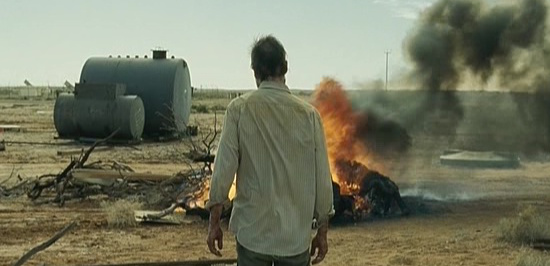
Discuss this and other Doomsday Reels columns in the forum.